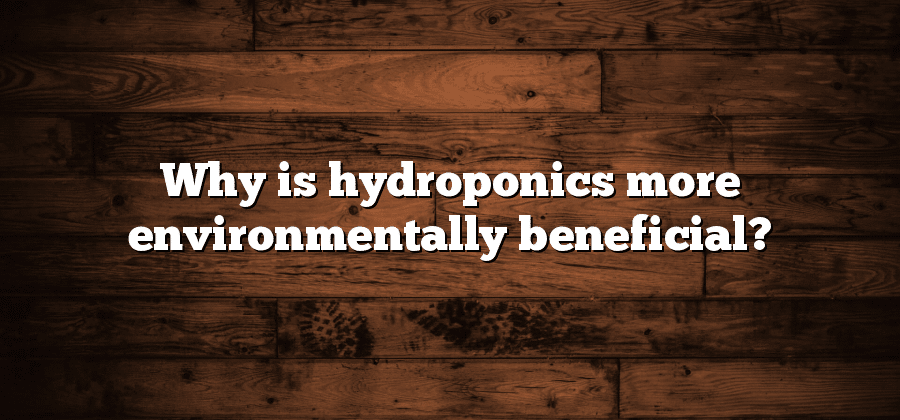Resource Conservation: Efficient use of water, nutrients, and space.
Hydroponics is a system that exemplifies resource conservation through the efficient use of water, nutrients, and space. Traditional agriculture often involves excessive water consumption, with much of it being lost through evaporation or unused by plants. In contrast, hydroponics utilizes a recirculating system that minimizes water waste by delivering nutrients directly to the plant roots, allowing for optimal absorption. This efficient use of water not only reduces water consumption but also decreases the strain on freshwater resources, making hydroponics a sustainable choice for agriculture.
Furthermore, hydroponics promotes efficient nutrient usage. In traditional farming, nutrients are often lost through leaching or can become inaccessible to plants due to soil conditions. In hydroponics, nutrients are carefully measured and delivered directly to the plants, ensuring that they are efficiently utilized. This precise control not only minimizes nutrient waste but also allows for optimal nutrient absorption and plant growth. Additionally, by eliminating the need for soil, hydroponic systems can be designed and arranged in a way that maximizes space utilization, making them ideal for areas with limited arable land or urban environments.
Reduced Soil Erosion: Absence of soil minimizes erosion risks.
Hydroponics, a soil-less farming technique, offers significant advantages in reducing soil erosion risks. In traditional agriculture, soil erosion is a common problem caused by the forces of wind and water. The absence of soil in hydroponics eliminates this concern altogether. With no soil to be washed away by heavy rains or blown away by strong winds, hydroponic systems are inherently more resilient to erosion. This not only protects the land and ensures a stable growing environment but also contributes to the overall sustainability of the farming practice.
By preventing soil erosion, hydroponics also prevents the loss of essential nutrients present in the soil. In conventional agriculture, erosion can strip away nutrients, leading to nutrient deficiencies in the soil and impairing productive farming. In contrast, hydroponic systems utilize a precisely controlled nutrient solution that is directly delivered to the plants’ roots. This eliminates the risk of nutrient loss due to erosion, ensuring that the plants receive a consistent and adequate supply of vital nutrients. As a result, hydroponics promotes more efficient nutrient uptake and utilization by plants, leading to healthier crops and improved overall yield potential.
Decreased Water Pollution: Hydroponics prevents nutrient runoff.
Hydroponics, the soil-less method of growing plants, offers numerous benefits when it comes to decreasing water pollution. One of the most significant advantages is its ability to prevent nutrient runoff. With traditional farming techniques, nutrients applied to the soil often get washed away by rainwater and end up contaminating nearby water sources. This runoff can lead to an overabundance of nutrients in aquatic ecosystems, causing imbalances that harm fish and other organisms. However, with hydroponics, the nutrients are contained within the closed system, ensuring that they are efficiently absorbed by the plants and not wasted or released into the environment. As a result, hydroponics minimizes the risk of nutrient runoff and helps maintain the health of our water bodies.
Furthermore, hydroponics systems also minimize the need for synthetic fertilizers, which is another significant contributor to water pollution. In traditional agriculture practices, chemical fertilizers often leach into nearby waterways, leading to algae blooms and disrupting the natural balance of aquatic ecosystems. However, with hydroponics, the nutrient solution is carefully balanced, providing just the right amount of essential elements for plant growth. This targeted approach eliminates the need for excessive fertilization and prevents potential pollution of water sources. By reducing the use of synthetic fertilizers, hydroponics contributes to the overall improvement of water quality and helps protect our aquatic ecosystems.
Mitigation of Pesticide Use: Less reliance on chemical pest control.
Hydroponic systems provide an innovative solution for reducing the reliance on chemical pesticides in agricultural practices. With the precise control over nutrient delivery and optimal growing conditions, these systems limit the opportunities for pests to establish and thrive. By maintaining a clean and controlled environment, hydroponics minimizes the need for chemical intervention, resulting in a significant reduction in pesticide use.
Unlike traditional soil-based farming methods, hydroponics eliminates the need for soil and the potential contamination of crops with harmful pesticides. Instead, these systems rely on integrated pest management techniques, such as biological controls and physical barriers, to manage pests effectively. This approach not only reduces the environmental impact of pesticide use but also minimizes the risks to human health associated with prolonged exposure to chemical substances. As a result, hydroponics offers a sustainable and eco-friendly alternative that mitigates the negative effects of pesticide use in agriculture.
Lower Carbon Footprint: Hydroponics reduces transportation and energy requirements.
Hydroponics, as a sustainable farming method, offers significant advantages in terms of reducing the carbon footprint associated with transportation and energy requirements. Unlike conventional agriculture, where crops are grown in far-flung locations and transported over long distances to consumers, hydroponics allows for local production of fresh produce. By eliminating the need for extensive transportation networks, the greenhouse gases emitted by conventional farming practices can be greatly minimized.
Moreover, hydroponics operates with a reduced reliance on energy-intensive processes. Traditional agriculture often requires vast amounts of energy for tasks such as tilling, irrigation, and controlling pests. In contrast, hydroponics relies on carefully controlled systems that use water and nutrients efficiently, eliminating the need for excessive energy consumption. This streamlined approach not only reduces carbon emissions but also contributes to the overall sustainability of the agricultural industry.
Adopting hydroponic methods presents a viable solution to combatting climate change and reducing the environmental impact of agriculture. By localizing production and optimizing resource usage, hydroponics offers an environmentally-friendly alternative with a significantly lower carbon footprint. As the world continues to grapple with the challenges posed by climate change, embracing innovative farming techniques like hydroponics becomes increasingly crucial in our efforts to build a more sustainable future.






